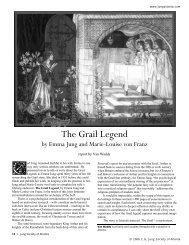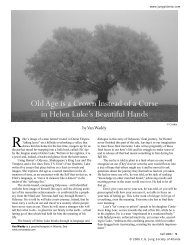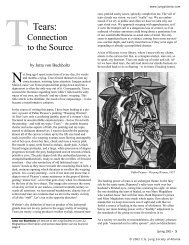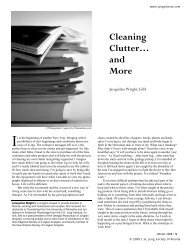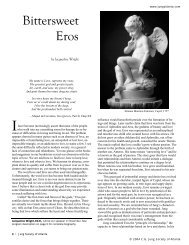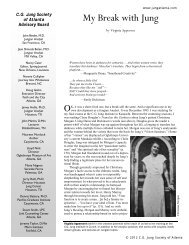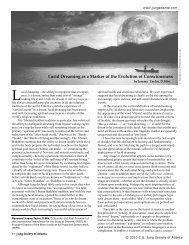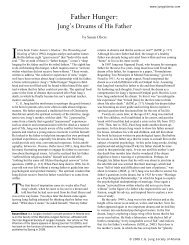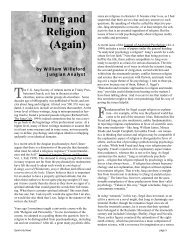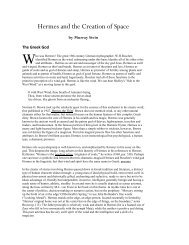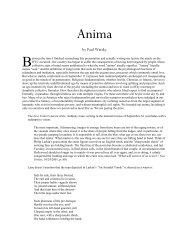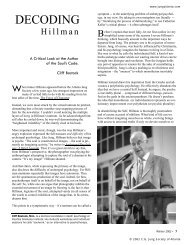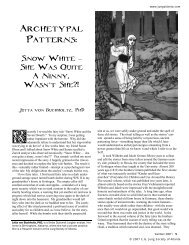Sarah Palin, Mama Grizzlies, Carl Jung, and the - C.G. Jung Society ...
Sarah Palin, Mama Grizzlies, Carl Jung, and the - C.G. Jung Society ...
Sarah Palin, Mama Grizzlies, Carl Jung, and the - C.G. Jung Society ...
Create successful ePaper yourself
Turn your PDF publications into a flip-book with our unique Google optimized e-Paper software.
<strong>Sarah</strong> <strong>Palin</strong>,<br />
<strong>Mama</strong> <strong>Grizzlies</strong>,<br />
<strong>Carl</strong> <strong>Jung</strong>,<br />
<strong>and</strong> <strong>the</strong><br />
Power of Archetypes<br />
by Arianna Huffington<br />
I<br />
’ve been thinking about this paradox: <strong>the</strong> most important<br />
political ad of 2010 so far did not play on television, <strong>and</strong><br />
came from someone not currently running for any office. It<br />
was <strong>Sarah</strong> <strong>Palin</strong>’s latest web video, “<strong>Mama</strong> <strong>Grizzlies</strong>.”<br />
For those who haven’t seen it yet, <strong>the</strong> video features footage<br />
of women of various ages taken at an assortment of Tea Party<br />
<strong>and</strong> <strong>Palin</strong> rallies, accompanied by audio clips from a recent<br />
<strong>Palin</strong> speech. Among <strong>the</strong> choice sound bites:<br />
“It seems like it’s kind of a mom awakening... women are<br />
rising up.”<br />
“I always think of <strong>the</strong> mama grizzly bears that rise up on<br />
<strong>the</strong>ir hind legs when somebody is coming to attack <strong>the</strong>ir cubs.”<br />
“You thought pit bulls were tough? Well, you don’t wanna<br />
mess with <strong>the</strong> mama grizzlies!”<br />
It’s classic <strong>Palin</strong>. And, as often is <strong>the</strong> case with <strong>Palin</strong>, <strong>the</strong><br />
video doesn’t feature a single word about policy—as many of<br />
her critics have pointed out. But <strong>the</strong>y are completely missing<br />
<strong>the</strong> point. Indeed, this video <strong>and</strong> <strong>the</strong> response to it are a perfect<br />
illustration of why we need to widen <strong>the</strong> scope of our political<br />
analysis.<br />
We are awash in crises right now—crises that require smart<br />
<strong>and</strong> creative policy fixes. So why is somebody who so rarely<br />
deals in policy fixes so popular? It’s because <strong>Palin</strong>’s message<br />
operates on a level deeper than policy statements about <strong>the</strong><br />
economy or financial reform or health care or <strong>the</strong> war in Af-<br />
Arianna Huffington is <strong>the</strong> co-founder <strong>and</strong> editor-in-chief of The<br />
Huffington Post, a nationally syndicated columnist, <strong>and</strong> author of<br />
thirteen books. In May 2005, she launched The Huffington Post, a<br />
news <strong>and</strong> blog site that has quickly become one of <strong>the</strong> most widelyread,<br />
linked to, <strong>and</strong> frequently-cited media br<strong>and</strong>s on <strong>the</strong> Internet.<br />
www.jungatlanta.com<br />
ghanistan.<br />
To really underst<strong>and</strong> her appeal, we need less policy analysis<br />
<strong>and</strong> more psychology. Specifically, we need to hear from<br />
that under-appreciated political pundit <strong>Carl</strong> <strong>Jung</strong>.<br />
It’s not <strong>Palin</strong>’s positions people respond to—it’s her use of<br />
symbols. <strong>Mama</strong> grizzlies rearing up to protect <strong>the</strong>ir young?<br />
That’s straight out of <strong>Jung</strong>’s “collective unconscious”—<strong>the</strong><br />
term <strong>Jung</strong> used to describe <strong>the</strong> part of <strong>the</strong> unconscious mind<br />
that, unlike <strong>the</strong> personal unconscious, is shared by all human<br />
beings, made up of archetypes, or, in <strong>Jung</strong>’s words, “universal<br />
images that have existed since <strong>the</strong> remotest times.” Unlike<br />
personal experiences, <strong>the</strong>se archetypes are inherited, not acquired.<br />
They are “inborn forms... of perception <strong>and</strong> apprehension,”<br />
<strong>the</strong> “deposits of <strong>the</strong> constantly repeated experiences of<br />
humanity.”<br />
This is <strong>the</strong> realm <strong>Palin</strong> is working in—I’m sure unintentionally—<strong>and</strong><br />
it’s why she has connected so deeply with a large<br />
segment of <strong>the</strong> public. In fact, her evocation of mama grizzlies<br />
has a particularly resonant history in <strong>the</strong> collective unconscious.<br />
According to <strong>the</strong> <strong>Jung</strong>ian Archive for Research in Archetypal<br />
Symbolism, “The bear has long fascinated mankind, partly<br />
because of its habit of hibernation, which may have served as a<br />
model of death <strong>and</strong> rebirth in human societies.”<br />
As a matter of fact, ano<strong>the</strong>r very popular Republican politician<br />
once used <strong>the</strong> image of a bear in an ad. The bear was used<br />
differently, but to powerful effect.<br />
There’s a bear in <strong>the</strong> woods. For some people, <strong>the</strong> bear is<br />
easy to see. O<strong>the</strong>rs don’t see it at all. Some people say <strong>the</strong> bear<br />
is tame. O<strong>the</strong>rs say it’s vicious <strong>and</strong> dangerous. Since no one can<br />
really be sure who’s right, isn’t it smart to be as strong as <strong>the</strong><br />
© Robertplotz | Dreamstime.com<br />
Fall 2010 • 11<br />
© 2010 C.G. <strong>Jung</strong> <strong>Society</strong> of Atlanta
ear? If <strong>the</strong>re is a bear...<br />
Simple. Forceful. Policy-free. And a very successful ad for<br />
Ronald Reagan’s re-election campaign in 1984. It raised <strong>the</strong><br />
question of whe<strong>the</strong>r Walter Mondale would be strong enough to<br />
st<strong>and</strong> up to <strong>the</strong> lurking bear—in this case, <strong>the</strong> Soviet Union.<br />
Reagan won 525 electoral votes to Mondale’s 13.<br />
Like <strong>Palin</strong>, Reagan was not thought to be a policy heavyweight,<br />
<strong>and</strong>, like her, he was often ridiculed by <strong>the</strong> punditocracy.<br />
And, like Reagan, <strong>Palin</strong> has come to prominence in a time<br />
of national crisis, a state of affairs in which appeals to <strong>the</strong><br />
collective unconscious are much more powerful—<strong>and</strong> dangerous—than<br />
in normal times.<br />
J ung<br />
himself was exquisitely aware of such a possibility,<br />
saying that during troubled conditions experienced by large<br />
numbers of people “explosive <strong>and</strong> dangerous forces hidden<br />
in <strong>the</strong> archetype come into action, frequently with unpredictable<br />
consequences. There is no lunacy people under <strong>the</strong> domination<br />
of an archetype will not fall prey to.”<br />
What’s more, <strong>Palin</strong> not only has <strong>the</strong> ability to tap into<br />
archetypes, she also has a variety of social tools ready to help<br />
her do so. It’s impossible to “refudiate” her mastery of Facebook,<br />
Twitter, <strong>and</strong> YouTube. And, as Michelle Cottle writes in<br />
The New Republic, <strong>Palin</strong> is using <strong>the</strong>m to speak directly to her<br />
audience, going around <strong>the</strong> filter of <strong>the</strong> mainstream media:<br />
It’s an unconventional media strategy... Yet it’s hard to<br />
deny that <strong>Palin</strong>’s P.R. approach has not only succeeded but<br />
succeeded brilliantly. How? The most obvious element at work<br />
here is that <strong>Palin</strong> operates not as a politician but as a celebrity...<br />
The rules are different for celebrities: <strong>Palin</strong>’s megawattage<br />
enables her to comm<strong>and</strong> attention for every word <strong>and</strong> gesture,<br />
even as she largely stiff-arms <strong>the</strong> New York Times <strong>and</strong> Meet <strong>the</strong><br />
Press.<br />
Which leads Cottle to conclude:<br />
Any political strategist who orchestrated such brilliant<br />
success via such unconventional means would instantly be<br />
dubbed <strong>the</strong> P.R. genius of our time. But, as far as we know,<br />
<strong>the</strong>re is no crack communications team charting <strong>Palin</strong>’s course.<br />
At some point, even <strong>Palin</strong> haters may have to face <strong>the</strong> possibility<br />
that <strong>the</strong> P.R. genius is <strong>Sarah</strong> herself.<br />
And, as Dave Weigel put it in The Atlantic, it’s not as if <strong>the</strong><br />
media really even cares about policy as much as it likes to think<br />
it does. “This media is not going to care about her policies,” he<br />
writes. “If policies come up during debates, <strong>and</strong> she gives <strong>the</strong><br />
same answers she gives on Fox now, <strong>and</strong> Mitt Romney pounces<br />
on her, <strong>the</strong> story will not be that <strong>the</strong> GOP’s frontrunner gave a<br />
pallid answer. The story will be that Mitt Romney pounced.”<br />
In <strong>the</strong> end, Weigel concludes, “it’s hard to imagine <strong>Palin</strong><br />
competing at <strong>the</strong> policy level <strong>the</strong> press claims she needs to get<br />
to, but easy to imagine her competing at <strong>the</strong> level <strong>the</strong>y actually<br />
play on.”<br />
S o<br />
if you think <strong>Palin</strong>’s lack of policy prowess is somehow<br />
going to slow her ascent, think again. With unemployment<br />
predicted to hover just below double digits for<br />
possibly years to come, our vaunted recovery acknowledged to<br />
have stalled, <strong>and</strong> Americans’ faith in practically every economic<br />
<strong>and</strong> political institution at an all time low, it’s no surprise<br />
that people might respond irrationally. That’s what people do<br />
when <strong>the</strong>y’re afraid. And in <strong>the</strong> absence of a coherent narrative<br />
that makes people feel reassured <strong>and</strong> hopeful about <strong>the</strong>ir lives<br />
12 • <strong>Jung</strong> <strong>Society</strong> of Atlanta<br />
www.jungatlanta.com<br />
<strong>and</strong> <strong>the</strong>ir futures, <strong>the</strong>y’ll gravitate to whatever fills <strong>the</strong> vacuum.<br />
Especially mama grizzlies.<br />
So isn’t it wise to get a h<strong>and</strong>le on <strong>Palin</strong>’s true appeal sooner<br />
ra<strong>the</strong>r than later? Because, to quote that o<strong>the</strong>r archetypal ursine<br />
ad: “Some people say <strong>the</strong> bear is tame. O<strong>the</strong>rs say it’s vicious<br />
<strong>and</strong> dangerous. Since no one can really be sure who’s right,<br />
isn’t it smart to be as strong as <strong>the</strong> bear?”<br />
Adding to Arianna’s<br />
Reflections on <strong>Jung</strong>,<br />
Archetypes <strong>and</strong><br />
<strong>Sarah</strong> <strong>Palin</strong>’s<br />
<strong>Mama</strong> <strong>Grizzlies</strong><br />
by Dr. Robert Aziz<br />
T<br />
he idea that within all human beings <strong>the</strong>re exists<br />
“instincts” or innate patterns of behavior was widely<br />
accepted prior to <strong>Jung</strong>. <strong>Jung</strong>, for his part, took things a<br />
step fur<strong>the</strong>r when he identified, based on his own clinical observations,<br />
<strong>the</strong> existence of innate patterns of meaning. Initially,<br />
<strong>Jung</strong> spoke of <strong>the</strong> collective unconscious as containing both<br />
instincts <strong>and</strong> archetypes. In later <strong>the</strong>oretical revisions, however,<br />
<strong>Jung</strong> would describe <strong>the</strong> archetype as such as having two poles<br />
—one producing transpersonal behaviors, <strong>the</strong> o<strong>the</strong>r producing<br />
transpersonal apprehensions.<br />
The hero archetype could be used as an example of how<br />
this works. It is not uncommon for people to put <strong>the</strong>mselves at<br />
risk to help o<strong>the</strong>rs who are in danger. It is not uncommon for<br />
individuals to take action without thought or regard for <strong>the</strong>ir<br />
own safety. <strong>Jung</strong> would see this as an example of <strong>the</strong> instinctual<br />
side of <strong>the</strong> hero archetype taking over. On <strong>the</strong> o<strong>the</strong>r h<strong>and</strong>, it can<br />
also be observed that byst<strong>and</strong>ers watching this unfold will often<br />
feel deeply moved by what <strong>the</strong>y are watching. For <strong>Jung</strong> <strong>the</strong><br />
highly charged, spine-tingling feelings of those observing <strong>the</strong><br />
rescue are attributable to <strong>the</strong> transpersonal meaning that has<br />
been triggered within <strong>the</strong>m by way of <strong>the</strong> archetype. This is to<br />
say those who are observing <strong>the</strong> act are not simply experiencing<br />
one individual rescuing ano<strong>the</strong>r; ra<strong>the</strong>r, under <strong>the</strong> influence of<br />
<strong>the</strong> archetype of <strong>the</strong> hero, <strong>the</strong>y are experiencing an act of<br />
mythological proportions. This is why people are so readily<br />
compelled to attach <strong>the</strong> title of hero to those who place <strong>the</strong>mselves<br />
in harm’s way to help o<strong>the</strong>rs.<br />
Yet such labeling, we should also underst<strong>and</strong>, might not be<br />
Robert Aziz Ph.D. is a psychoanalytical <strong>the</strong>rapist, author <strong>and</strong> executive<br />
consultant within <strong>the</strong> business sector. He is a Clinical Member<br />
of <strong>the</strong> Ontario <strong>Society</strong> of Psycho<strong>the</strong>rapists. Dr. Aziz is <strong>the</strong> author of<br />
two scholarly books C.G. <strong>Jung</strong>’s Psychology of Religion <strong>and</strong> Synchronicity<br />
(1990) <strong>and</strong> The Syndetic Paradigm: The Untrodden Path<br />
Beyond Freud <strong>and</strong> <strong>Jung</strong> (2007). For more information visit<br />
www.robertaziz.com<br />
© 2010 C.G. <strong>Jung</strong> <strong>Society</strong> of Atlanta
without ill consequence. There is indeed an enormous difference<br />
between acting heroically under <strong>the</strong> influence of <strong>the</strong> archetype<br />
<strong>and</strong> being a hero in an absolute sense of that term. True<br />
heroic action is seldom a question of choice <strong>and</strong> it is equally<br />
seldom that those who act heroically feel entirely deserving of<br />
<strong>the</strong> credit <strong>the</strong>y are given for <strong>the</strong>ir actions. To <strong>the</strong> extent, <strong>the</strong>n,<br />
we identify an individual with <strong>the</strong> archetype, to <strong>the</strong> extent we<br />
impose by way of concretization <strong>the</strong> transpersonal on <strong>the</strong> personal,<br />
to <strong>the</strong> extent <strong>the</strong> transpersonal supplants <strong>the</strong> personal, we<br />
risk dehumanizing <strong>the</strong> individual for whom we have such high<br />
regard.<br />
Archetypal energies can have tremendous power over us<br />
<strong>and</strong> it clearly is no easy task bringing personal <strong>and</strong> transpersonal<br />
energies into a functional <strong>and</strong> balanced relationship, even<br />
under <strong>the</strong> best of circumstances. Historically, <strong>the</strong> ideologies <strong>and</strong><br />
ideals of secular <strong>and</strong> religious worldviews have served to propel<br />
us into <strong>the</strong> archetypal realm. More problematic still, is when<br />
individuals or groups use <strong>the</strong> archetypal to manipulate <strong>and</strong><br />
exploit o<strong>the</strong>rs. So we must always ask, what is it to touch <strong>the</strong><br />
ground? What is it to touch <strong>the</strong> ground, not in terms of how we<br />
view our fellow citizens ideologically, but ra<strong>the</strong>r, as human<br />
beings? What is it to touch <strong>the</strong> ground in terms of <strong>the</strong> genuine<br />
needs for healthcare <strong>and</strong> education? What is it to touch <strong>the</strong><br />
ground in terms of <strong>the</strong> realities of <strong>the</strong> costs of war, human <strong>and</strong><br />
o<strong>the</strong>rwise? What is it to touch <strong>the</strong> ground, not in terms of <strong>the</strong><br />
collective or religious values with which we concretely identify<br />
ourselves, but in terms of how we actually treat people? What is<br />
it to touch <strong>the</strong> ground in marriage, not in <strong>the</strong> sense of being<br />
married to <strong>the</strong> concretized ideal of marriage, but in terms of a<br />
genuine process of intimacy? What is it to touch <strong>the</strong> ground,<br />
<strong>and</strong> here we come back to Arianna’s important point, in terms<br />
of <strong>the</strong> formulation <strong>and</strong> presentation of genuine political policy,<br />
ra<strong>the</strong>r than simply using <strong>and</strong> abusing <strong>the</strong> archetypal image of<br />
“<strong>Mama</strong> <strong>Grizzlies</strong>” to deflect attention away from that critical<br />
task?<br />
To <strong>the</strong> extent <strong>the</strong> archetypal becomes a substitute in our<br />
political forums for <strong>the</strong> formulation <strong>and</strong> presentation of substantive<br />
policy, we find ourselves on a road that history has<br />
more than shown bodes unfavorably for democracies. The<br />
archetypal bereft of substantive policy has historically been <strong>the</strong><br />
language of demagogues. Similarly, <strong>the</strong> grotesque <strong>and</strong> altoge<strong>the</strong>r<br />
shameless archetypalization of culture has been <strong>the</strong><br />
hallmark of totalitarian states. Would we want to continue<br />
down this road? I think not. Hopefully, we will never see <strong>the</strong><br />
day when <strong>the</strong> archetypalization of our leadership would render<br />
policy discussions to be of no political consequence whatsoever.<br />
Hopefully, we will never come to a place where our<br />
Presidents <strong>and</strong> Prime Ministers, moving in <strong>the</strong> same archetypal<br />
orbit as <strong>Sarah</strong> <strong>Palin</strong>’s <strong>Mama</strong> <strong>Grizzlies</strong>, would be portrayed in<br />
word <strong>and</strong> image as omnipotent <strong>and</strong> omniscient leaders bereft of<br />
human attributes <strong>and</strong> limitations. Hopefully, for <strong>the</strong> sake of <strong>the</strong><br />
evolution of our culture, we will not succumb to such mindlessness.<br />
www.jungatlanta.com<br />
Fall 2010 • 13<br />
© 2010 C.G. <strong>Jung</strong> <strong>Society</strong> of Atlanta



